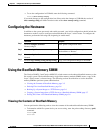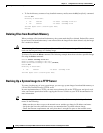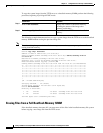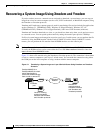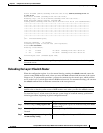
3-10
Catalyst 2948G-L3 and Catalyst 4908G-L3 Switch Router Software Feature and Configuration Guide
78-10408-03
Chapter 3 Configurations for the Layer 3 Switch Router
Recovering a System Image Using Xmodem and Ymodem
Recovering a System Image Using Xmodem and Ymodem
If you do not have access to a network server and need to download a system image, you can copy an
image from a local or remote computer (such as a PC, UNIX workstation, or Macintosh computer) using
the Xmodem or Ymodem protocols.
Xmodem and Ymodem are common protocols used for transferring files and are included in applications
such as Windows 3.1 (TERMINAL.EXE), Windows 95 (HyperTerminal), Windows NT 3.5x
(TERMINAL.EXE), Windows NT 4.0 (HyperTerminal), and Linux UNIX freeware (minicom).
Xmodem and Ymodem downloads are slow, so you should use them only when you do not have access
to a network server. You can speed up the transfer by setting the transfer port speed to 57600 bps.
If all local system images are damaged or erased on your Layer 3 switch router, you can perform the file
transfer by using the ROM monitor. On the Catalyst 2948G-L3 and the Catalyst 4908G-L3 switch
routers, you can perform the file transfer from the ROM monitor over the console port.
Note Perform file transfer from the ROM monitor with either Cisco IOS Release 12.0(7)W5(15a) or later.
To verify the ROM monitor version, enter either the Cisco IOS show version command or enter the
reset command from ROMMON mode.
Figure 3-1 shows a file transfer using the Xmodem or Ymodem protocols. The connection is from either
a local or a remote computer to your Layer 3 switch router. You can make the connection using either
the COM port on the local computer or using a modem with the remote computer.
Figure 3-1 Transferring a System Image to a Layer 3 Switch Router Using Xmodem and Ymodem
Protocols
Catalyst 2948G-L3 or
Catalyst 4908G-L3 switch
router downloading a
Cisco IOS software image
from a local or remote PC
38417
Telephone
network
Remote PC
running terminal
emulation software
and Xmodem and
Ymodem protocols
Modem
Modem
Console
port
Local PC running
terminal emulation
software and Xmodem
and Ymodem protocols







